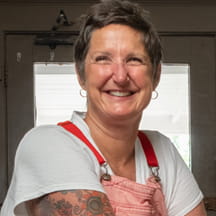A report from the Tennessee Department of Health on childhood asthma demonstrates the importance of Le Bonheur Children’s Hospital’s CHAMP (Changing High-Risk Asthma in Memphis through Partnership) program. The report, titled Childhood Asthma in Tennessee 2007-16, showed that 50% of pediatric hospital admissions in Tennessee due to asthma during that time occurred in Memphis and Shelby County.
The children in the report were at high risk for asthma exacerbations due to genetic predisposition, substandard housing conditions, poor access to health care, and lack of support to manage social determinants of health. The children received Medicaid (TennCare), indicating that each had an assigned primary care physician and access to medications at no cost. Yet these advantages were insufficient for families facing multiple barriers to disease management.
In response to this need, Le Bonheur Children’s physicians and Community Outreach division developed a different approach to care for these patients. In 2012, they received a Centers for Medicare and Medicaid Services (CMS) Innovation grant to fund their effort. Soon after, the CHAMP program evolved.
Improving asthma management for kids
CHAMP is a multidisciplinary team that delivers medical care consistent with the National Institutes of Health standards, reinforcing asthma education in the home and addressing patients’ environmental and social needs.
The CHAMP program is built on the fundamental principles of using evidence-based practices, establishing respectful relationships to build trust, improving the health care experience, hiring staff members who represent the population, improving access to care when patients really need it and addressing social determinants of health.
The goal of the CHAMP program is to improve asthma management for children who experience frequent and severe asthma exacerbations and preventable hospital visits. The metrics include reduced hospital utilization and reduced asthma exacerbations. CHAMP outcomes are evaluated using individual patient charge data provided by the TennCare administration.
The CHAMP team
Three people have been instrumental in the program’s development. Allergy and immunology physician Christie Michael, M.D., medical director for CHAMP, and associate Professor, The University of Tennessee Health Science Center, oversees the clinical environment and patient care. Program Director Susan Steppe, LCSW, supervises the community team members and oversees all administrative functions. Christina Underhill, Ph.D., is the director of evaluation for the Community Outreach division and is the chief evaluator for CHAMP. The team demonstrates the importance of combining best practices in medical care with community-based services and making effective use of data to drive program development to achieve outcomes.
Other CHAMP team members include advanced practice nurses who staff clinics under the supervision of the medical director. The CHAMP nurse and respiratory therapist play dual roles. They staff CHAMP clinics, but they also provide training to community educators and coordinate with primary care physicians and schools.
The community team consists of three community health workers (CHWs) under one supervisor. An operations support specialist tracks referrals, schedules CHAMP clinic appointments, processes billing and arranges transportation for clinic visits as needed.
Identifying and enrolling patients
To be eligible for CHAMP, patients must live in Memphis or Shelby County and be enrolled in TennCare. All candidates must have experienced numerous asthma-related emergency department visits or hospital admissions or have required frequent refills of rescue medication or steroid therapy in the previous 12-month period.
Potential CHAMP patients are identified in from the electronic medical record through a daily report that lists all children treated for an asthma-related diagnosis at any Methodist Le Bonheur Healthcare facility in the previous 24 hours. Eligible patients are assigned to community health workers, who contact families to explore program enrollment. About one-third of eligible patients enroll.
Enrollment occurs in the patients’ homes or via telehealth. During enrollment the CHWs explain the program, review medication, schedule the first clinic visit and complete forms. The second home visit is an environmental assessment to identify asthma triggers and provide guidance on trigger management. CHWs personally advocate with landlords or may refer families to Memphis CHiLD, Le Bonheur’s Medical-Legal partnership, for legal advocacy on housing issues.
The initial clinic visit sets the course for ongoing medical care and community intervention. The CHAMP clinical team completes a full medical history and assessment of each patient’s status in terms of impairment and risk. All patients receive an asthma action plan and asthma education from a certified asthma educator.
Families receive phone numbers that they can use to access after-hours services including the 24/7 call line and sick call triage that connects to the CHAMP staff during working hours. These services increase patients’ access to care and often prevent escalation of mild or moderate asthma episodes into serious attacks requiring hospital services. Patients typically are seen in the clinic quarterly or as needed.
Providing ongoing support
After the initial clinic visit, the CHWs make another home visit to review the medication and asthma action plan and deliver environmentally friendly cleaning supplies. CHWs articulate the importance of controller medication, demonstrate correct spacer use and ensure patients have appropriate medication available in the home.
Based on the needs and understanding of individual families, CHWs will schedule follow-up visits to check patient progress and support families to integrate basic asthma management into their daily schedules. CHWs can track ongoing medication refills by viewing TennCare charge data.
Collaboration with local schools is vital to supporting patients’ asthma management. Each year CHAMP provides asthma management training to schools’ nursing staff. The CHAMP respiratory therapist prepares a school packet for each school-aged CHAMP patient, which includes a copy of the child’s asthma action plan, albuterol, a spacer, and contact information for the respiratory therapist.
Successful asthma patient outcomes
From 2013 to 2020, the CHAMP program enrolled 1,088 children between the ages of 2 and 18. As of December 31, 2020, there were 447 active patients and 641 past participants. The following outcomes pertain to participants who completed a full year of the program, comparing data 12 months pre- and post-intervention.
- 55% reduction in emergency department visits
- 70% reduction in hospitalizations and observations
- 39% reduction in urgent care visits
- 26% decrease in sick outpatient visits
- 53% reduction in total asthma exacerbations (hospitalizations, observations, and urgent care, emergency department, outpatient clinic, and primary care visits)
- 76% increase in total outpatient asthma-related clinic visits
The Centers for Medicare and Medicaid (CMS) sponsored an evaluation conducted by the University of Chicago. The evaluation compared the results of CHAMP patients to a matched control group identified by the TennCare administration. The findings showed statistically significant reductions in emergency department visits as well as asthma and all-cause hospitalizations, with a $2,160 reduction in cost of care per child per year.
The Future of CHAMP
CHAMP’s positive outcomes led the way for extending the program’s operation beyond the original innovation grant award period. Continuation was initially made possible by Le Bonheur Children’s pledge to support CHAMP through local philanthropic funds.
Currently, CHAMP has contractual relationships with two TennCare payers. The first arrangement, made in 2018, is a fee-for-service agreement to cover home and school visits made by CHWs. In 2020, CHAMP established a vendor contract with another payer that involves a per-patient monthly service fee. This type of payment strategy covers a greater portion of program costs and poses new areas for growth and development with increased program scalability.
The CHAMP leadership team views this expansion to stay true to the initial goal of the program: to improve asthma management for high-risk patients.



